This is an essay written by benicio127 and  whitesycamore. It was posted on fuckyeahjasontodd in two parts: part one and two. They have updated and added a few more elements and scenes to the essay.
whitesycamore. It was posted on fuckyeahjasontodd in two parts: part one and two. They have updated and added a few more elements and scenes to the essay.
This essay is heavily meta-textual and is a deconstruction and analysis of how Jason was painted as a character post-death (and resurrection). Obviously, Jason Todd can't literally be "blamed" for his own death by anyone, since as a fictional character he has no autonomy, and therefore cannot be guilty or innocent, blameless or deserving. Neither are we suggesting that anyone in the Bat-family canonically believes that Jason deserved to die. However, we will argue that a victim blaming attitude is pervasive in the way Jason's death was written about after the fact. Moreover, this victim blaming would not only be unjust in a real life context, it also requires the reader to ignore many vital plot details of A Death In The Family.
The death of Jason Todd is one of the most iconic moments in Batman's history. The loss of his young partner is one of the greatest tragedies of Bruce Wayne's life, considered about as great as the deaths of his own parents when they were gunned down in front of him.
Following Jason's death, the Dark Knight is tormented by his own failure to prevent it, and during the years afterwards, Jason was most frequently alluded to in the context of Bruce struggling with this guilt.
However, Jason's death is also often described as the inevitable result of his own reckless and disobedient nature. Sometimes this goes even further, and Jason is implied to -- and readers are meant to assume -- that he was responsible for, or even deserving of his own fate.
In Deadman: Dead Again #2, written by Steve Vance and released October 2001, Deadman/Boston Brand watches helplessly as Jason Todd is killed by the Joker.
In this story, Jason and Deadman are ghosts. In the first panel, Deadman berates Batman, despite the fact that Batman cannot hear him.
Deadman/Boston Brand:Where were you ten minutes ago, chump? What the hell were you thinking, letting Robin take on the Joker alone? I'd like to inhabit you and make you slug yourself over the head with a --
Jason:No -- it's not his fault! I screwed up. I disobeyed his orders... went out on my own.
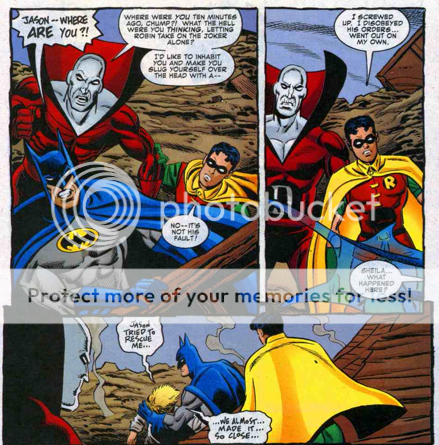
Here, Jason is putting the blame on himself. What is victim blaming? This document, prepared by the Canadian Resource Centre for Crime explains it thoroughly. Some victims and survivors do do that to themselves, however, in reality, society will often blame a victim for transgressions they did and hold the victim partially or entirely responsible for their abuse, assault, murder, and so on. According to the article, survivors of homicides, like family members and friends, will even sometimes blame the victim in order to ease their own guilt.
In essence, blaming the victim suggests that the victim deserved "what was coming to them" or "what they got." A common theory is that victim blaming arises from the human tendency to believe in a "just world." That is, people prefer to imagine that the universe is on balance a fair, reasonable place, and that human beings have more control over their fates than they actually do. So, in order to preserve their belief in this just world, people often imagine that victims must be somehow responsible for their own misfortune. The fictional worlds that people create often reflect this just world sensibility too; after all, there are no truly random events in fiction, all occur in order to serve the story and to express ideas. Many writers also feel that stories with a "moral" are more satisfying than stories in which tragedy happens for no reason - and this may explain why Jason has come to be routinely blamed for his own death, even though it is inconsistent with the facts of the original story.
The idea has been put forward on more than one occasion that Jason's incompetence, recklessness, anger, hot-headedness, attitude, etc. got him killed. That he was essentially responsible for his own death.
And unfortunately for Jason, this attitude of victim-blaming has retroactively tarnished his reputation as a crime-fighter and a hero, and even fuelled retcons that seek to paint him in a darker light even from the beginning of his career as Robin.
An excellent example of this is seen in Batman 456, as then new Robin Tim Drake is attempting to solve a mystery and can’t seem to come up with the answer. He imagines former Robins Dick Grayson and Jason Todd speaking to him and chastising him for not being able to live up to the name of Robin.
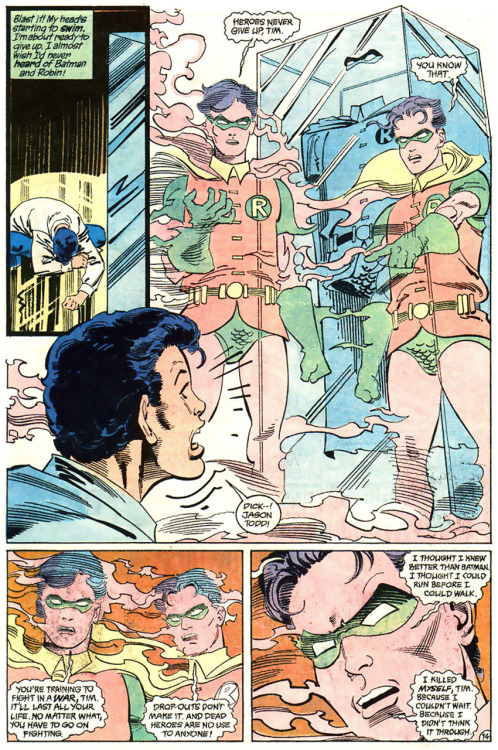
Jason:“Drop outs don’t make it and dead heroes are no use to anyone! I thought I knew better than Batman. I thought I could run before I could walk. I killed myself, Tim. Because I couldn’t wait. Because I couldn’t think it through.”
But Jason, as we will explain in a few paragraphs, did think it through: he wanted to save his mother from the Joker. And although it is a hallucination, and is ostensibly cautioning Tim about failure, it is one more retcon that paints Jason as the one who failed, the one who wasn’t good enough and basically, the one who was the major contribution to his own demise.
And in Teen Titans #29, written by Geoff Johns, Jason tells Tim that he failed. And note he says that right after he says he died, reinforcing the idea that his death was a failure on his part.
Jason:It didn't surprise anyone when I died. When I failed. I failed -- but I'm still beating you.
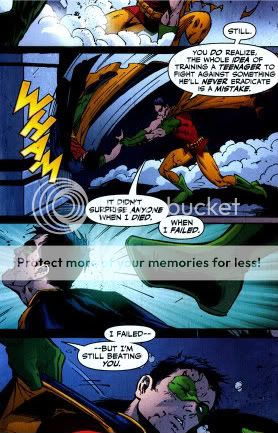
Which is not what happened at all. Jason went to save his biological mother dressed in his Robin costume. The reason he went to save her is because he believed she was in danger, trapped in a warehouse with the Joker.
Batman's orders were specifically: You stay here and keep an eye on that warehouse until I return. Take no action until I get back! I repeat no action! Just for once, please listen to me, Jason! Don't tangle with the Joker alone! Wait for me to get back, please!
To which Jason thinks: Sorry, Bruce. But that's my mother in there with that lunatic.
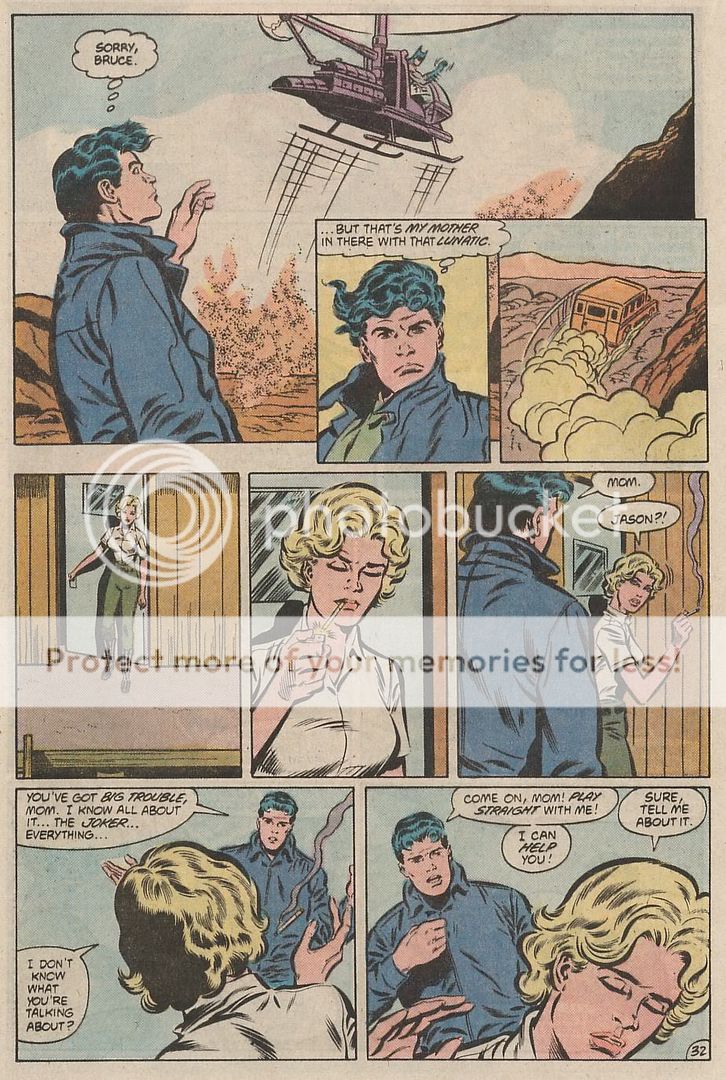
Batman specifically ordered Jason not to engage the Joker alone. However, when his mother emerged from the building unharmed, Jason decided to go and talk to her, to explain that he knew she was being blackmailed by the Joker and to offer his help as Robin. It was at this point that she asked him to come into the warehouse, claiming that the Joker was no longer there. She lied. She betrayed him and sold him out to the Joker, which cost him his life.
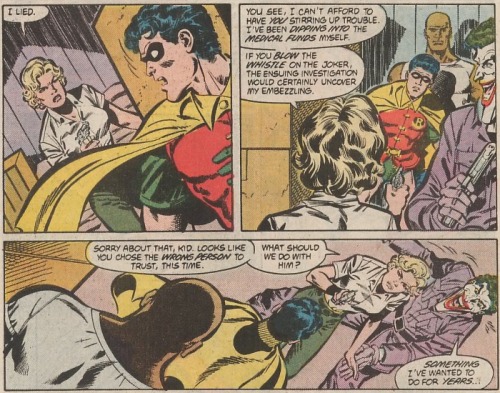
The Joker, being evil and insane, beat Robin with a crowbar and then blew him up to get to Batman because Robin is the closest person to Batman. Batman failed to get there in time to save Jason.
There were many elements in A Death In The Family, but gradually Jason's demise came to have only one regularly used meaning: a sober warning to the Robins who followed. It seems that after his death, the writers tacitly agreed through retcons that Jason should be remembered as the Robin who killed himself through his own foolishness. However, in order for this meaning to work, one has to gloss over the actual events of A Death In The Family, which were propelled more by his mother’s betrayal than rashness on Jason's part. It's also interesting that the one of the most striking elements of the story - the betrayal itself - is very rarely addressed afterwards. This may be because the Batfamily aren't supposed to know precisely how Jason died, or more likely because the betrayal doesn't fit with Jason's symbolic position as "the Robin who killed himself."
Additionally, Jason was not the only Robin to disobey orders, either. In Batman: The Return, written by Grant Morrison, Bruce tells Dick Grayson he can't work with Damian because Damian does not follow orders.
Dick says: Bruce, come on! I made a career out of not doing anything I was told when I was Robin.
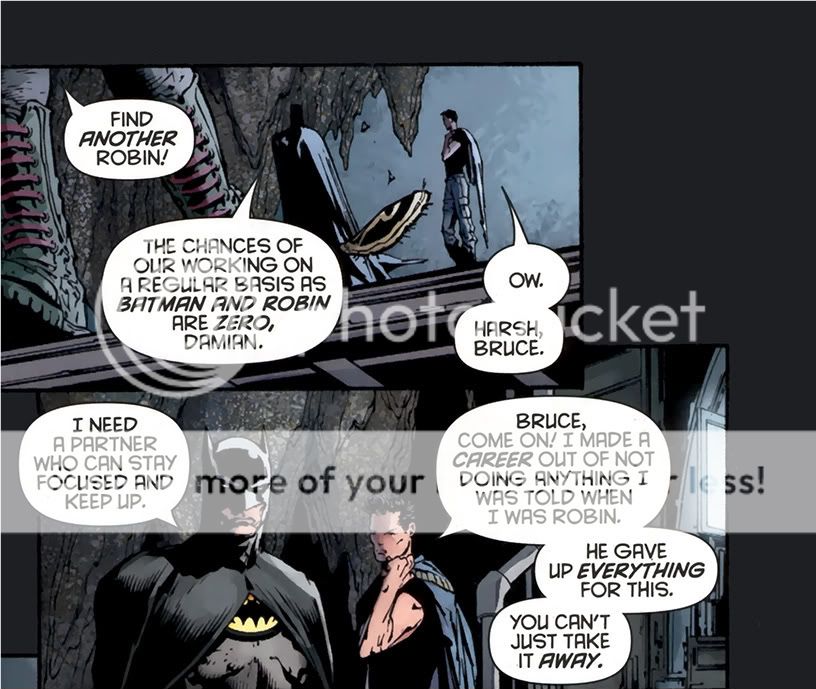
It's also no secret that Jason in the role of Robin was not as well loved as Dick was by the fans. And of course, Dick was not killed in the field. This essay, however, is not meant to highlight what Dick could or could not do; but rather show that despite Jason disobeying orders as all Robins have done, it is because he died that it is consistently argued that he was incompetent or that in some way his character flaws resulted in his death.
Jason was angry and rebellious, but there's no suggestion prior to his death that he was incompetent in the field. What he did do was deal out a harsher form of punishment to criminals and, in one instance, possibly kill a serial rapist. Yet, once he dies, that is forgotten and revisionist history makes us believe that because he died, he must not have been good enough.
On top of that, the failure to save Jason was intended to be Batman's greatest failure; it was essentially a story of the hero's failure, not the victim or the sidekick's. In the A Death in the Family story arc, even as Bruce heads off to intercept a truckload of Joker toxin, he has misgivings about leaving Jason on his own.
He says:"I'm already regretting leaving Jason behind. Something deep inside me is screaming that that was the wrong move."

He knew that Jason was in danger, but he failed to listen to his instincts. There was also a failure on Bruce's part to recognize Jason's emotional/anger issues. Bruce himself had difficulty coping with his parents' deaths and that's part of the reason why he put on the cowl. When he saw Dick's parents' fall to their deaths, he believed he could offer him a way to cope, the same as he had.
When Jason came along, Bruce took him in because the young teen had no one. Jason's adoptive mother, Catherine, had died of a drug overdose.His petty criminal father, unbeknownst to Jason at the time, had been killed by Two-Face. Again, Bruce assumed making Jason Robin would help him to cope with this loss. He also had selfish reasons for doing it -- he missed having a Robin around since Dick had grown up and become Nightwing.
But remember, Bruce and Dick came from loving homes where they had the basic essentials to survive: food, shelter, clothing. Bruce came from a very wealthy family, and Dick from a happy, loving home in the circus, but Jason came from very meager means. We learn that Jason loved his parents, even nursed Catherine for a year and stole to keep her alive; and he was angry, hurt and upset when he learned of his father's murder. But of them loving him back in return, we have little knowledge. And no two persons in reality cope the same way, so naturally, two different characters may cope differently when faced with similar situations.
Children like Jason, deprived of a stable upbringing, often have greater difficulty coping with and recovering from traumatic events than others do. In Stress, Coping and Development in Children,** it's explained that temperament, familial support and other sources of external support are the most reliable predictors of child and adolescent adjustment following stress and/or trauma. Children with "difficult" temperaments are more likely to cope poorly in response to trauma, as are those who lack family support. (**Garmezy & Rutter (eds.) (1983) Stress, Coping and Development in Children. New York: McGraw-Hill) Jason could very well be described as having a difficult temperament, and on top of that, he lived alone for nearly a year after he was orphaned (while his dad was in jail and his stepmother had died), seemingly without any external support.
But Bruce ignored the many signs that Jason was not adjusting well to his role as Robin. Jason had arguably suffered more from the effects of crime and poverty than anyone else in the Batfamily. After the death of his parents, he lived alone in Crime Alley without adult protection, and had already been forced to compromise his own moral values by stealing to survive.
"Hey, I don't wanna learn to be no crook. I just boost what it takes to survive..." Jason says to Batman in Batman 409.
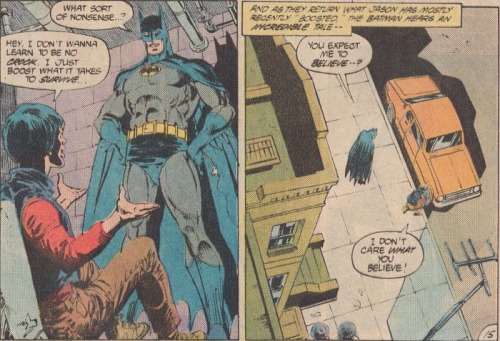
Most crucially, Bruce ignored Jason's propensity towards anger and violence. Upon discovering Jason brutally beating a pimp, the following exchange took place in Batman 422:
Bruce:"I think he's had enough Robin. What were you trying to do, kill him?"
Jason:"Would it have been that big of a loss if I had?"
Bruce (to himself):"What's going on in that head of yours, Jason?"
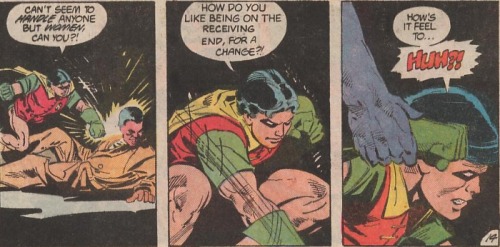
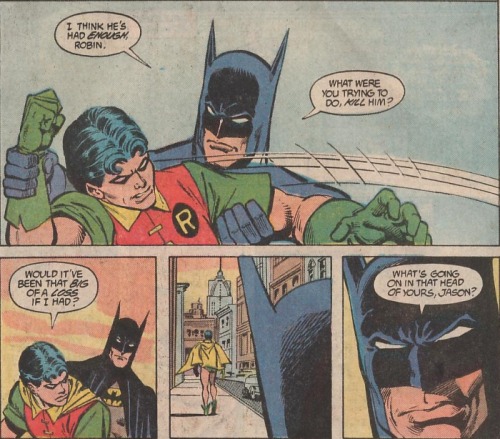
However, following this incident, Bruce made no serious attempt to discover exactly what was going on inside Jason's head. Neither did he truly listen to Jason's frustration and anger with the justice system and its failures. It is not surprising that a boy with Jason's background would have a radically different attitude to criminals and crime fighting than Bruce or Dick, but Bruce refused to fully engage in moral discussions with him.
Even after Bruce suspect that Jason may have allowed a serial rapist to fall to his death (or even pushed him himself), he did not suspend Jason's crime-fighting activities. He refused to accept that being Robin was not a suitable outlet for Jason's rage until their working relationship reached its absolute breaking point, at the beginning of A Death in the Family.
And then Jason died. And Bruce did blame himself, which is something real survivors often do. But he, and other supporting characters, were more than willing to also lay blame at the victim's feet.
Here's a scene from Nightwing #99, written by Devin Grayson, where Dick is speaking to Bruce:
Dick:But Jason didn't know what the hell he was doing or why
In the context of this discussion, Dick is blaming Bruce for failing to impart the same clear moral code to Jason that he felt he himself understood when he was Robin. But his choice of words in “didn't know what the hell he was doing” also carry the implication, again, that Jason was incompetent or not sufficiently gifted enough to be Robin. And as mentioned before, the theme of Jason's incompetence is one that gained more traction after his death, fuelled in part by the very idea that he failed to save his own life.
This idea surfaces again and again in the DCU comics – even in the midst of Bruce's guilt and self-blame, the text is scattered with suggestions that Jason should share some or all of that blame.
In Gotham Knights #44, written by Scott Beatty, when Bruce returns home from the Middle East without Jason, Alfred tells him: "It's not your fault. The lad was determined to disobey you."
Alfred:And then you went and found another child with vengeance in his heart. I told you this could very well end in disaster. I warned you. I did everything but beg and plead.
"It's not your fault. The lad was determined to disobey you."
Here, Alfred blames Bruce in his internal monologue, but then chooses to comfort him by saying that Jason's death was not his fault, instead describing it as the inevitable consequence of Jason's disobedience. The implication that the reader is expected to garner is that Jason's reckless, rebellious nature was the direct cause his own death – rather than the tragic (and rather improbable) convergence of coincidences that it in fact was.
In Detective Comics #790, written by Andersen Gabrych, Batman visits Jason's gravesite on Jason's 18th birthday. Batgirl Cassandra Cain attends with him. At this moment, it should be noted that Jason is not the only Robin to be blamed or believed to be at fault for his/her death. Stephanie Brown, too, was blamed for being incompetent, reckless, and held responsible for starting a gang war – although this was in part because Batman, her field commander and mentor, deliberately withheld vital information from her. Stephanie was tortured and mutilated by Black Mask and was believed* to have been killed by him. Again, the fault was assigned to her, the victim, and not the insane and evil Black Mask. See Project Girl Wonder for more information.
In these first few panels, Batman, in an attempt to note the similarities between Jason and Stephanie, calls Stephanie "reckless" and one who "doesn't know when to quit."
In these next two panels, Bruce says Jason was "brash. Impulsive. Headstrong. Never looking before he leapt." The way it reads is that these appear to be bad characteristics that directly led to his death.
Rather than respect Jason (and Stephanie) as heroic, or at the very least playing a heroic role, the attitude of victim blaming is continually reiterated in the text by other superheroes in the crime-fighting community.
Again, here we have Adventure Comics #3, written by Geoff Johns as well, from 2009. In this, Superboy questions Tim Drake on why he chose to wear the Red Robin costume. Conner calls Jason both the "bad Robin" and the "failed Robin."
When Tim took over the role of Robin in late 1989 in A Lonely Place of Dying, creators went out of their way to make sure he was nothing like Jason.
As Mary Borsellino writes in her paper, "A lot like Robin if you close your eyes: Displacement of meaning in the Post-Modern Age,"
Borsellino continues by saying:
In an early Robin mini-series, written in 1990 by Chuck Dixon, before Tim was featured in his own ongoing Robin comic, Tim questions whether he's good enough to be Robin, particularly in the wake of Jason's death. Bruce tells him:
I don't need an impulsive partner, someone who jumps in without considering the consequences. That's not what I'm looking for, Tim.
He says:
Fail here and I don't get up again. Fail here and I die. And all I can think of is that I might let him down. Might show the world that I wasn't really worthy of the honor he gave me.
It is, in essence, suggesting that to fail is to not be worthy of the name Robin. And in part, implying that because Jason "failed" or "died" he just wasn't worthy of the title, or couldn't live up to the honour and prestige the title of Robin holds. As Batman said to Dick in Frank Miller's futuristic tale The Dark Knight Strikes Again, it's implying Jason simply "couldn't cut the mustard."
Such an act of selflessness that Jason did, to save his mother -- who had betrayed him in the first place -- and die doing so should afford him the benefit of being called a hero. And yes, Tim believed Jason to be a hero and Jason's memorial and grave suggest as such. But fans and characters of that universe are also led to believe that Jason is still somehow responsible for his own demise.
The idea that Jason got himself killed because he disobeyed orders is one that's often repeated by creators, right down to their letter to an eight-year-old girl who said she cried "for a whole day" after learning of Robin's death.
Notably, DC has never done another 1-900 vote-in on a character's demise or anything else related to a call-in stunt because of a character since Jason's death. The comic creators and editors were blasted by fans and the media for the stunt. Denny O'Neil, then editor who oversaw Jason's death, spoke about this on the Blu-Ray Documentary for Under the Red Hood.
O'Neil even blames a caller who is rumoured to have dialed the 1-900 hotline number over and over again to kill Jason. Yet, it was O'Neil's idea to create the 1-900 call-in stunt in the first place.
Here's what O'Neil had to say in the foreword of Robin: Tragedy and Triumph:
The comment O'Neil makes is, "he was an interesting, and somewhat spooky case of a fictional character seizing control of his own destiny. Nobody ever decreed he be less likeable than his predecessor..."
Because interestingly, that is in fact, what was decreed. In an interview for The Many Lives of the Batman, edited by Roberta E. Pearson and William Uricchio, O’Neil said they actually played up the idea of making Jason “bratty”:
I think that once writers became aware the fans didn’t like Jason Todd, they began to make him bratty. I toned some of it down. If I had to do it again, I would tone it down more. But you make these decisions from hour to hour and sometimes not under the best conditions.
So we did a story, for example, in which it was left vague as to whether or not Jason pushed someone off a balcony. The writer, Jim Starlin, thought he did—I thought he didn’t, but we let the reader decide. There was certainly no doubt that throughout much of the storyhe wanted to push this guy off of the balcony.
And then when we were building up to the death of Robin we made him rebellious—he ran away, and in a way he got what he was asking for. He disobeyed Batman twice, and that’s what led his demise. (via OzandEnds/WeeklyRobin blogspot)
It's troubling that O'Neil's view of Jason as “less likeable” and a “disagreeable problem child” seem so closely tied to his realistic portrayal as a troubled youth from a severely impoverished background. And again, O'Neil focuses on Jason's transgressions, but what's worse, actually comes out and says: "in a way, he got what he was asking for." Does disobedience really deserve death? Most parents would say a time-out, some might even opt for removing privileges or grounding a child. But in Jason's case, it clearly means capital punishment, and boy, oh boy, did he deserve it!
The idea that Jason got what he deserved even made its way explicitly onto the printed page, in the form of the Joker's commentary as he bludgeons Jason. The Joker calls Jason a "bad boy,” and whimsically describes his brutal beating as both a "punishment" and a "severe spanking.” Although Starlin chose to put these words into the mouth of the villain, ostensibly the unreliable voice of "anti-reason,” they could be read as a darkly humourous reflection of the real life views of Starlin and O'Neil.
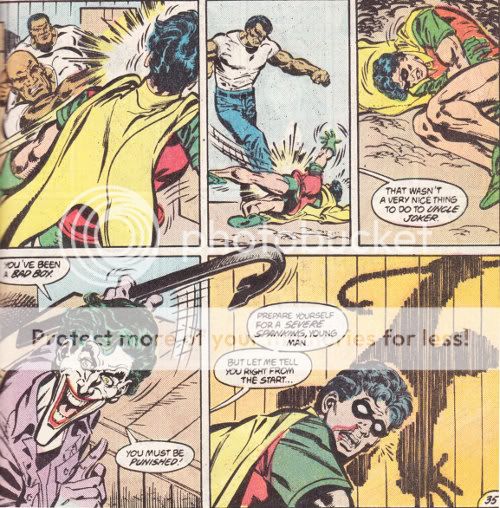
Joker:“That wasn’t a very nice thing to do to Uncle Joker. You’ve been a bad boy. You must be punished. Prepare yourself for a severe spanking, young man. But let me tell you right from the start... This is going to hurt you a lot more than it does me.”
Starlin, who wrote Jason in Batman issues up to and including A Death in the Family, stated he didn't like the idea of Robin or a kid sidekick.
Starlin in an interview with Universo HQ:
I wanted to kill off Robin as soon as I started writing Batman. The idea of taking a kid along to fight crime is ludicrous.
And, in an interview with Adelaide Comics, he says he wanted to kill off Robin so badly that he pitched a story about "giving Robin AIDS."
At one point DC had this AIDS book they wanted to do. They sent around memos to everybody saying “What character do you think we should, you know, have him get AIDS and do this dramatic thing” and they never ended up doing this project. I kept sending them things saying “Oh, do Robin! Do Robin!”
Starlin’s frank proclamation that he intended to kill Robin right from the beginning of his run belies O’Neil’s attempt to frame Jason’s demise as an organic development rooted in his essential character. The death of Jason Todd was not a “case of a fictional character taking control of his own destiny,” but a long-planned outcome. Jason was doomed from the outset, written as he was by a creative and editorial team who were no longer sure what purpose the character of Robin was supposed to serve. It seems as though it was much easier for the editorial team of Starlin and O’Neil to blame an individual character for the “failure” than to admit that who or what Robin in the modern era should be was in a state of uncertainty.
Unfortunately, for Jason, the victim blaming has not only held the character accountable for his demise, but has also had a detrimental effect on his reputation among his fellow crime-fighters, and has birthed retcons that attempt to paint him as a bad seed from the very start.
And, really, who decides -- or should be the decision maker in a fictional character's life and death? Not the character, but the creators. Yet, this is an attempt on the editors part to shift the blame, once again, to Jason -- a fictional character.


Log in to comment